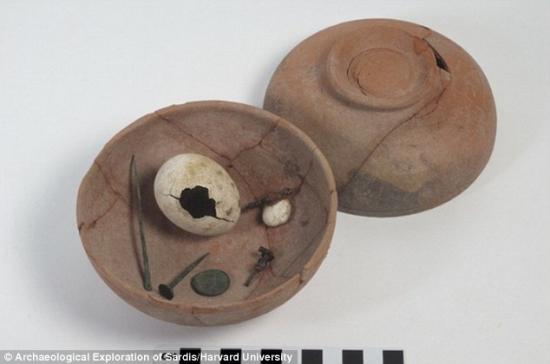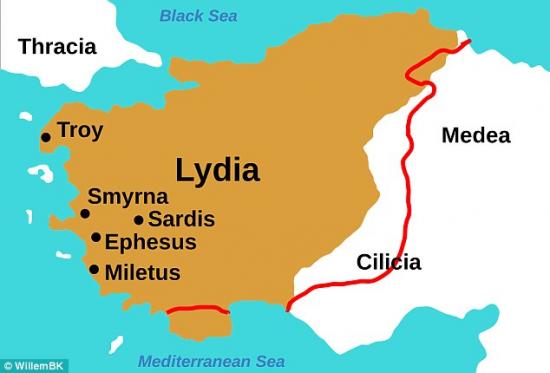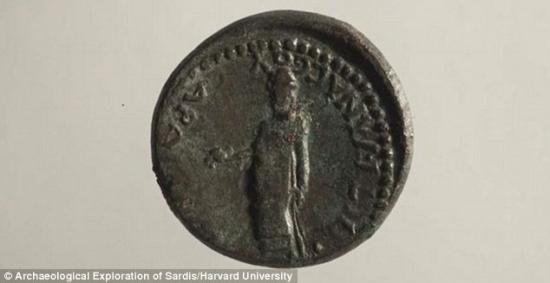Victoria Woollaston
Source - http://www.dailymail.co.uk/sciencetech/article-2539826/The-2-000-year-old-pots-containing-Roman-magical-offerings-complete-INTACT-egg-shell.html
Two pots were found buried in the ancient city of Sardis, in Turkey
-
Inside, archaeologists found a pierced eggshell, bronze tools and a coin
-
Eggs were said to have been lucky charms and used to ward off evil spirits
-
Region was destroyed by an earthquake in A.D 17 and the eggs may have been used as ritual offerings to prevent future disasters
Buried beneath the Turkish city of Sardis, archaeologists have discovered what is believed to be an ancient lucky charm, designed to ward off evil spirits.
Despite being buried around 2,000 years ago, the two pots are relatively intact and one contains the remains of a perfectly preserved, fragile eggshell.
The region was destroyed by an earthquake in AD 17 and it is thought the egg was a ritual offering, used to protect the area from future disasters.

Buried beneath the ancient Turkish city of Sardis, archaeologists have discovered two pots dating back 2,000 years. The pots, pictured, are relatively intact and contain the remains of a perfectly preserved eggshell which may have been used to ward off evil spirits
Residents of Sardis rebuilt the region following this earthquake, and the settlement remained for centuries until it was finally abandoned in the 1402.
The discovery of the pots was made by archaeologists from the University of Wisconsin-Madison and the University of Missouri in partnership with the Archaeological Exploration of Sardis.
The artefacts were found buried beneath what would have been an elite building in the city that was once the capital of the ancient kingdom of Lydia.
In addition to the eggshell, the researchers also found small bronze tools and a coin.
The eggshell had been deliberately pierced, to allow the insides to flow out, but the rest of the shell had remained in one piece.
There have been many reports of eggs being used in ancient rituals, with particular reference to ‘uncrossing’ and warding off demons.

The Sardis region was destroyed by an earthquake in A.D 17 and archaeologists claim the egg was a ritual offering, used to protect the area from further disasters. The eggshell has been deliberately pierced, to allow the insides to flow out, and was found alongside small bronze tools, pictured

Sardis was the ancient capital city of Lydia, in Turkey's Manisa Province, pictured. Its location and wealth made it an important city in the Persian Empire, as well as into the Roman and Byzantine eras
Uncrossing is the act of undoing curses, or reversing bad fortune. The U.S. archaeologists believe the residents of Sardis would have planted the eggs into the ground to prevent another earthquake in the region.

The artefacts were found beneath what would have an elite building in the ancient city, remains pictured
Eggshells were also used in so-called ‘demon traps’ in modern-day Iraq and Iran to disarm evil forces.
Elsewhere, the coin features a symbol believed to be the goddess Cybele.
Cybele was linked with the earth, and in particular the mountains, and this offering may have been to appeal to her for protection.
Elizabeth Raboult from the University of Missouri told Live Science that the objects give a unique insight into how the earthquake would have affected the residents of Sardis.
She said: ‘It's one person's way of coping with the uncertainties and tumultuous events of that period’ and added that the find was ‘really fantastic.’
Sardis was the ancient capital city of Lydia, in Turkey’s Manisa Province. Its location and wealth made it an important city in the Persian Empire, as well as into the Roman and Byzantine eras.
The Sardis settlement, found in modern-day Sart, was situated in the middle of Hermus valley, at the foot of Mount Tmolus. Excavations have previously uncovered a bath-gym complex and a synagogue in the region.
In A.D 17, under the reign of Tiberius, Sardis was destroyed by an earthquake and the whole area had to be rebuilt.

In addition to the eggshell, the researchers found a coin, pictured, inside the pots. The coin features a symbol believed to be the goddess Cybele. Cybele was linked with the earth, and in particular the mountains, and this offering may have been used to appeal to her for protection